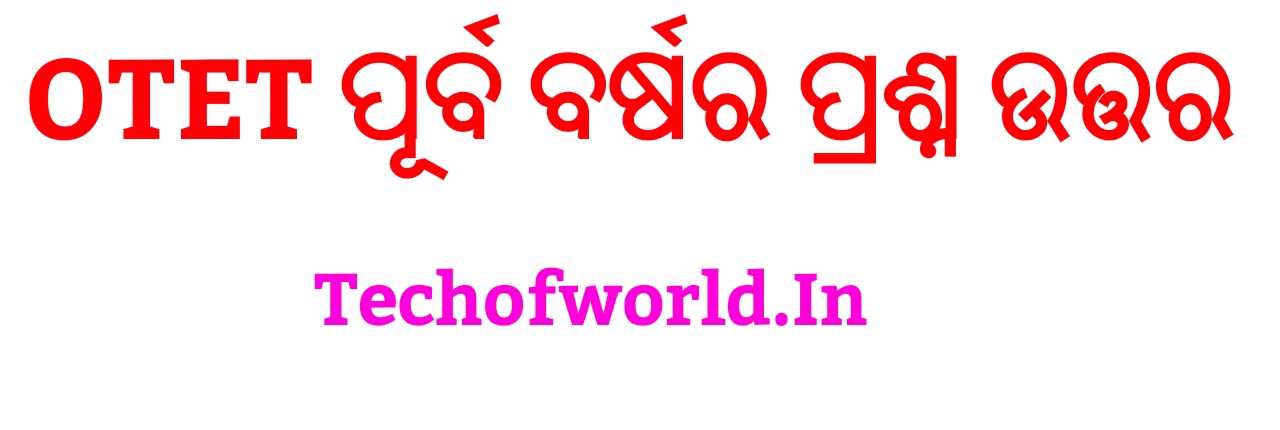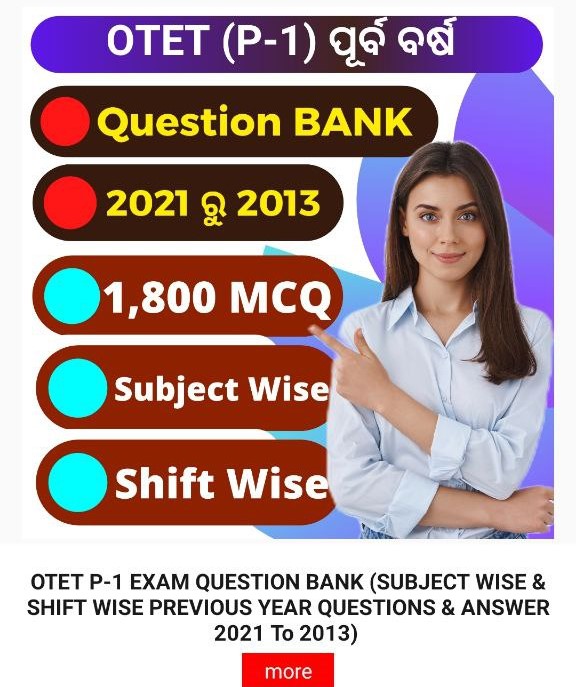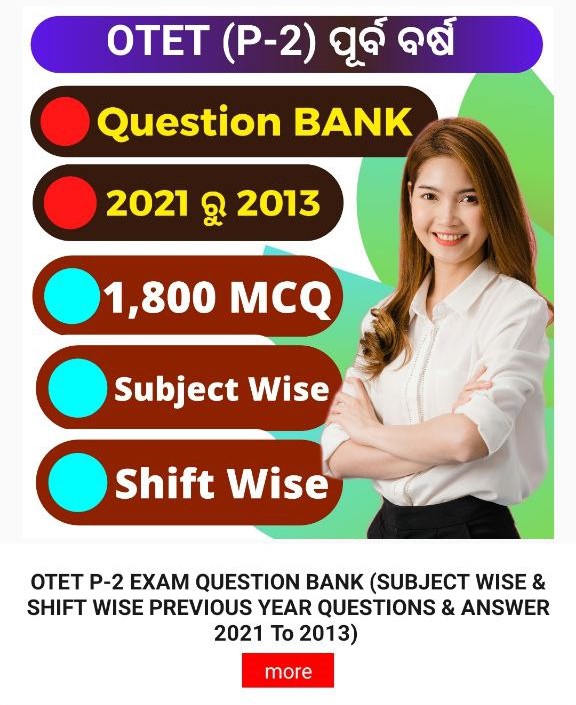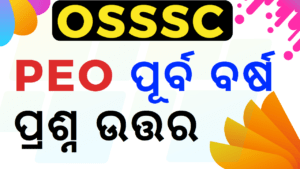Odisha Teacher Eligibility Test (OTET) is an examination for all Odisha candidates both male and female who have eligibility . OTET Syllabus 2022. This examination is conducted by Board of Secondary Education Odisha,Cuttack (BSE).So application registration has been started for all candidates in 2022. (Mock Test Series) OTET Previous Year Questions. OTET Exam Pattern 2022
OTET Exam Eligibilty 2022. The step by step instructions for online registration, applicability & eligibility of candidates, syllabus & its structure, instructions for physical handicapped candidates & format for continuing certificate are available in’the website “www.bseodisha.ac.in”. OTET Previous Year Questions
Candidates can appear Paper-l or Paper-ll or both the papers as per their eligibility. the candidates appearing both Pbper-l & ll shall have to fill up application form separately. Under no circumstances the last date for submission of application forms shall be extended.
Table of Contents
OTET Apply 2022 Details-
| Name Of Exam | Odisha Teacher Eligibility Test (OTET) |
| Conducted By | Board Of Secondary Education, Odisha |
| OTET Apply Date | 10-October-2022 |
| OTET Apply Last Date | 19-October-2022 |
| Qualification Needed |
Paper-1 – CT & B.Ed Candidates (Final Year Also Eligible) |
| Paper-2 – CT+ Degree & B.Ed Candidates (Final Year Also Eligible) | |
| Benefit Of Paper-1 | You Can Be A Teacher In Govt. U.P. School |
| Benefit Of Paper-2 | You Can Be A Teacher In Govt. M.E. School |
| U.P. School Teacher | Salary- 7,000 Starting Up To 6 Years (After 6 yrs- 25,000) |
| M.E. School Teacher | Salary-7,000 Starting Up To 6 Years (After 6 yrs- 25,000) |
| Mark % Needed To Apply | UR- 50% |
| SEBC/OBC/SC/ST/PH- 45% | |
| OTET Qualifying Mark | UR- 90 (Out Of 150 Marks) |
| Other- 75 (Out Of 150 Marks) | |
| AGE | No Limit (OTET Previous Year Question) |
| Full Eligibility | Click Here |
| Documents Needed To Apply | Mobile No,Email Id,Photo,Signature |
| Application Fee |
UR & SEBC/OBC- 500/- |
| SC & ST- 300/- | |
| Apply Link | Click Here |
| Official Website | Click Here |
| Selection Mode | CBT (Computer Based Test) |
| Exam Mode | Online |
| Type Of Question Comes | MCQ |
| Negative Mark | No Negative Mark In Exam |
| Exam Center | In Your District |
| Admit card | Coming Soon |
| Admit card Download | Click Here |
| Exam Date | Coming Soon |
| Result Date | Coming Soon |
| Syllabus | Click Here |
| Previous Year Question | Click Here |
| Mock test | Click Here |
Previous Year Subject Wise Questions & Answer PDF Download Links-
| Items | Paper-1 | Paper-2 |
| All Subject Wise (2021 To 2013)
Total Question- 3600+ |
Buy All PDF | Buy All PDF |
| Demo PDF | Demo PDF |
OTET Previous Year Questions Paper & Answer 2022 To 2012 Pdf !!
OTET PAPER 1 Question
| Year | Questions | Answer Key |
| 2022 2nd | Download | Download |
| 29-Aug-2022 | Download | Download |
| 9-April-2021 | Download | Download |
OTET PAPER 1 Question
| -1 Exam Dates | 1st Shift | 2nd Shift | 3rd Shift |
| 5-Aug-2019 | Download | ||
| 6-Aug-2019 | Download | ||
| 7-Aug-2019 | Download | ||
| 8-Aug-2019 | Download | ||
| 9-Aug-2019 | Download | Download |
OTET Previous Year Questions Paper -1
| Year | Questions | Answer Key |
| 2019-1st | Download | |
| 2017-1st | Download | Download |
| 2016-1st | Download | Download |
| 2016-2nd | Download | Download |
| 2015-1st | Download | Download |
| 2015-2nd | ||
| 2014-1st | Download | Download |
| 2014-2nd | ||
| 2013-1st | Download | Download |
| 2013-2nd | Download | Download |
OTET PAPER 2 Question
| Year | Questions | Answer Key |
| 2022 2nd | Download | Arts– Answer Key
Science– Answer Key |
| 9-April-2021 | Download | Arts– Answer Key
Science– Answer Key |
| Paper-2 Exam Dates | 1st Shift | 2nd Shift | 3rd Shift |
| 13-Aug-2019 | Download | ||
| 14-Aug-2019 | Download | Download | |
| 16-Aug-2019 | Download | ||
| 17-Aug-2019 | Download | ||
| 18-Aug-2019 | Download |
OTET Previous Year Questions Paper -2
| Year | Questions | Answer key |
| 2019-2nd | Download | |
| 2017-1st | Download | Download |
| 2016-1st | Download | Download |
| 2016-2nd | Download | Download |
| 2015-1st | Download | Download |
| 2015-2nd | ||
| 2014-1st | Download | Download |
| 2014-2nd | ||
| 2013-1st | Download | Download |
| 2013-2nd | Download | Download |
| 2012-1st | Download | Download |




Bhari bhala
Password- 6rgm6uk4,roll no-19010002091(OTET) date 13 1st Shift ,name-padmini malobishoy, please send OTET pdf
Good sir I love u
Ct exam entrance ra nahi ki,,, paper
Great Sujit Sir.
Sir pls give otet paper 2 question answer of 2018 and 2019(leaked paper)
Sir pls give us social studies question and answer keys
Great Joby hi
Sujit bhai nios student can apply odisha teacher job …Please brother gives comment
yes
22014,2015,2017 ra paper 2 nhi plz upload karantu
ok..ame try karibu
Odia languages note OTET paper 1 please sir send karntu
ok
2014-15 ro 2nd set question paper and answer miliboni ki
available nahi
2015 ro p-2 answer key download houni kno pain
download hauchi
2019ra otet all shift question nahi
jaldi upload haba
Sir previous questions math paper-2 r 2013-2019 all pdf send me please
Good job sir . I support you. 🙏🙏🙏
Sir previous otet urdu questions (paper- 1) 2016-2019 all pdf send me please
we will try to upload
Sir please upload otet urdu questions paper (paper-1)
Sir otet paper-2 urdu quction upload Please
why you donot uplode OTETPAPPER-2 2019 ans papers
there is answer below the every question